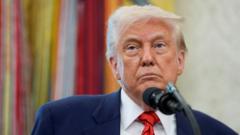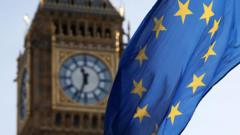The announcement of US tariffs by President Trump has sparked strong reactions from international leaders, with Italian Prime Minister Giorgia Meloni and others condemning the measures as detrimental. They highlight the need for dialogue and efforts to maintain global trade relations amidst rising tensions.
Global Leaders Condemn Trump's New Tariffs: A Call for Dialogue

Global Leaders Condemn Trump's New Tariffs: A Call for Dialogue
As President Trump imposes new tariffs on European goods, global leaders voice their concerns and urge for negotiation to avoid trade conflict.
Italian Prime Minister Giorgia Meloni has expressed her disapproval of the new tariffs announced by US President Donald Trump, labeling them as "wrong" after he revealed plans for a 20% tariff on European Union imports. These measures, set to take effect on April 5 for a general 10% baseline tariff and escalating for nearly 60 countries by April 9, have raised alarms among world leaders concerned about potential trade wars. Meloni, known for her alignment with Trump, emphasized that these tariffs would be harmful to both the EU and the US, and she is committed to seeking an agreement to avert further conflict.
Spanish Prime Minister Pedro Sánchez voiced his commitment to safeguard Spanish businesses and workers, stressing the importance of maintaining an open global market. Ireland's trade minister Simon Harris expressed readiness to engage in negotiations with the US, labeling negotiations as the preferred approach, while Taoiseach Micheál Martin described Trump’s decision as "deeply regrettable," asserting that it serves no party's interests.
From outside the EU, Australian Prime Minister Anthony Albanese warned that the American public would bear the brunt of these "unjustified tariffs." He rejected the notion of retaliatory measures, declaring that Australia would not engage in escalating trade hostilities that would ultimately harm economic growth and raise prices.
In Latin America, Brazil’s Congress approved the Economic Reciprocity Law aimed at countering the tariffs. Brazilian President Luiz Inácio Lula da Silva expressed that Brazil would not remain passive in light of Trump's imposition of tariffs. Meanwhile, US Treasury Secretary Scott Bessent advised against retaliatory measures from other countries, claiming such actions could lead to escalation.
Interestingly, the announcements made by Trump did not mention Canada and Mexico, despite their being key trade partners. The White House indicated that previous 25% tariffs targeting these two nations would remain in effect as part of broader strategic aims concerning border and drug issues. Canadian Prime Minister Mark Carney has already warned that the tariffs would have significant repercussions, particularly through a 25% automobile tariff, which he anticipates will affect millions of Canadians. He vowed to implement countermeasures against these tariffs, asserting they would have profound implications for the global trading framework.



















